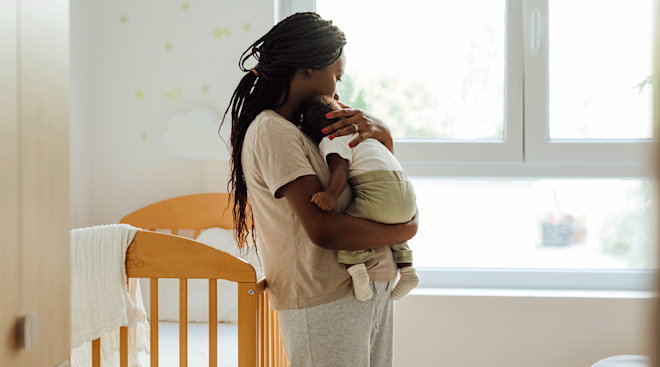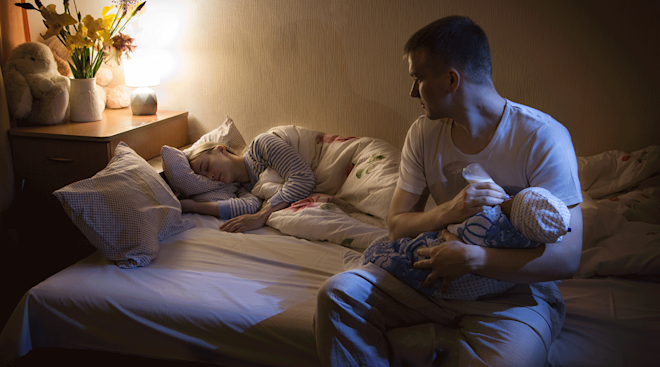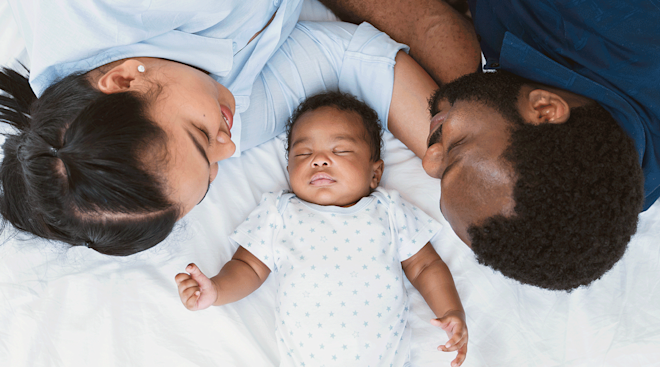New Study Shares Tips for Helping Baby Sleep Through the Night
A ten-year study conducted by Penn State Center for Childhood Obesity Research (CCOR) has found that parents trained in responsive parenting practices may be able to help baby sleep longer through the night.
The INSIGHT study—an acronym for “intervention nurses start infants growing on healthy trajectories”—began in 2012 with 279 mothers and their first-born babies and looked at the effect of responsive parenting practices on infant sleep. The mothers were specially trained on INSIGHT bedtime routines and how to respond to nighttime waking and fussiness.
Results showed that children in the INSIGHT intervention group not only slept longer each night and were better at soothing themselves than the control group, but they also had a lower BMI throughout the first three years of their life and had a higher capacity for emotional regulation and cognitive development. Reinforcing what we already know, sleep is good! So how can you help your baby sleep better? Researchers share their findings below.
Responsive Parenting Tips for Helping Baby Sleep Longer
- Establish a strict bedtime. “People sometimes think that if they keep their babies awake with them later at night, then the baby will sleep later. But the research shows that early establishment of a bedtime between seven and eight o’clock will help babies sleep longer," said Emily Hohman, assistant research professor at CCOR, in a release about the study.
- Create a calming bedtime routine. Research shows consistent bedtime routines promote longer sleep cycles. Craft a routine with soothing activities for your child, like reading or taking a bath. Hohman recommends that babies who aren’t rolling over yet should be swaddled to increase their sense of calm.
- Put your child to bed when they are drowsy but still awake. This will help them learn to easily self-soothe when they are close to the brink of sleep.
- Use “lighter touch” soothing methods when baby awakes. While your first instinct when baby wakes from sleep may be to feed them, Hohman encourages parents to use “lighter touch” soothing strategies like offering a pacifier or providing words of reassurance and gentle touches. More engaged soothing like rocking and feeding can always be used as a secondary soothing measure if baby remains distressed or shows signs of hunger. “During the daytime, parents should feel free to use more active soothing strategies like holding or rocking, but these should be used more judiciously at nighttime in order to promote better sleep,” says Hohman.
The benefits of better sleep for baby extend beyond your child’s health to your whole family’s health too. According to the study release, research shows that sleep-deprived parents are more likely to develop depression and be involved in traffic accidents, while well-rested parents are more likely to remember important tasks and be more vigilant when it comes to child safety.
Of course, every baby’s sleep journey is different—and what works for one family may not work for another. If you’re struggling with getting your baby to sleep through the night you aren’t alone. For more tips on getting baby to sleep, check out these suggestions from sleep experts and pediatricians. Plus, flag any specific questions or concerns to your pediatrician. They’re the best resource to ensure both baby and you get a good night’s rest.
Please note: The Bump and the materials and information it contains are not intended to, and do not constitute, medical or other health advice or diagnosis and should not be used as such. You should always consult with a qualified physician or health professional about your specific circumstances.
Navigate forward to interact with the calendar and select a date. Press the question mark key to get the keyboard shortcuts for changing dates.





















































